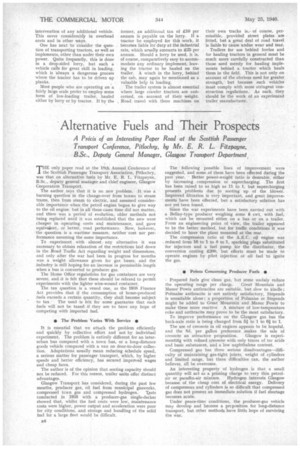Alternative Fuels and Their Prospects
Page 32

If you've noticed an error in this article please click here to report it so we can fix it.
A Précis of an Interesting Paper Read at the Scottish Passenger Transport Conference, Pitlochry, by Mr. E. R. L. Fitzpayne, B.Sc., Deputy General Manager, Glasgow Transport Department ,
THE only paper read at the 18th Annual Conference of the Scottish Passenger Transport Association, Pitlochry, was that on alternative fuels by Mr. E, R. L. Fitapayne, B.Sc., deputy general manager and chief engineer, Glasgow Corporation Transport.
The author says that it is 710 new problem. It was a burning question in the change-over from horses to steam trams, then from steam to electric, and assumed considerable importance when the petrol engine began to give way to the oil engine, but in all these cases time did not matter, and there was a period of evolution, older methods not being replaced until it was established that the new were cheaper in operating costs and maintenance, and gave equivalent, or better, road performance. Now, havever, the question is a wartime measure, neither cost nor performance assuming the same importance.
To experiment with almost any alternative it was necessary to obtain relaxation of the restrictions laid down in the Road Traffic Act regarding weight and dimensions, and only after the war had been in progress for months, was a weight allowance given for gas buses, and the industry is still hoping for an increase in permissible length when a bus is converted to producer gas.
The Home Office regulations for gas containers are very severe, and it is felt that these should be relaxed to permit experiments with the lighter wire-wound container.
The tax question is a vexed one, as the 1938 Finance Act provides that if the consumption of home-produced fuels exceeds a certain quantity, they shall become subject to tax.' The need is felt for some guarantee that such fuels will not be taxed if they are to have any hope of competing with imported fuel.
• The Problem Varies With Service •
It is essential that we attack the problem efficiently and quickly by collective effort and not by individual experiment. The problem is entirely different for an interurban bus compared with a town bus, or a long-distance goods vehicle compared with a van on door-to-door collection. Adaptations usually mean reducing schedule speed, a serious matter for passenger transport, which, by higher speeds and better efficiency, has secured imprcrved wages and cheap fares.
The author is of the opinion that seating capacity should not be reduced. For this reason, trailer units offer distinct advantages.
Glasgow Transport has considered, during the past few months, producer gas, oil fuel from municipal gasworks, compressed town gas and compressed hydrogen. Tests conducted in 1938 with a producer-gas single-decker showed that, whilst the fuel costs were low, maintenance costs were higher, power output and acceleration were poor for city conditions, and storage and handling of the solid fuel for a large meet would be difficult.
The following possible lines of improvement were suggested, and some of them have been effected during the past year. Better power-weight ratio is desirable, either by increasing compression or supercharging. The first has been raised to as high as 71 to 1, but supercharging presents, problems due to sooting up of the blower. Improved filtration is very important, and great improvements have been effected, but a satisfactory solution has not yet been found.
Since the war experiments have been carried out with a Bellay-type producer weighing some 8 cwt. with fuel, which can be mounted either on a bus or on a trailer. From an engineering point of view, the trailer appeared to be the better method, but for traffic conditions it was decided to have the plant mounted at the rear.
The compression ratio of the A.E.C. oil engine was reduced from 16 to 1 to 8 to 1, sparking plugs substituted for injectors and a fuel pump for the distributor, the conversion costing £200, but efforts must be made to operate engines by pilot injection of oil fuel to ignite the gas.
fa Points Concerning Producer Fuels •
Prepared fuels give clean gas, but some unduly reduce the operating range per charge. Great Mountain and Manor Pawls anthracites are suitable, but slow to kindle; Polmaise anthracite is not entirely satisfactory, Stepends is unsuitable alone; a proportion of Polmaise or Stepends might be added to Great Mountain and Manor Powis to make these more reactive A mixture of low-temperature coke and anthracite may prove to be the most satisfactory.
To improve performance on the Glasgow gas bus the back-axle ratio is being changed from 51 to 1 to 61 to 1.
The use of creosote in oil engines appears to be hopeful, and the 8d. per gallon preference makes the sale of
creosote an attractive proposition. Glasgow is experimenting with refined creosote with only traces of tar acids and basic substances, and a low naphthalene content.
Compressed gas has three serious disadvantages—difficulty of maintaining gas-tight joints, weight of cylinders and limited range, but these difficulties can, the author believes, all be overcome.
An interesting property of hydrogen is that a small quantity will act as a priming charge to very thin petrol air or paraffin-air mixture. Hydrogen interests Glasgow because of the cheap cost of electrical energy. Delivery of compressors and cylinders is so difficult that compressed gas does not present an immediate solution if fuel shortage becomes acute.
Under peace-time conditions, the producer-gas vehicle may develop and become a proposition for long-distance transport, but other methods have little hope of surviving the war.




























































